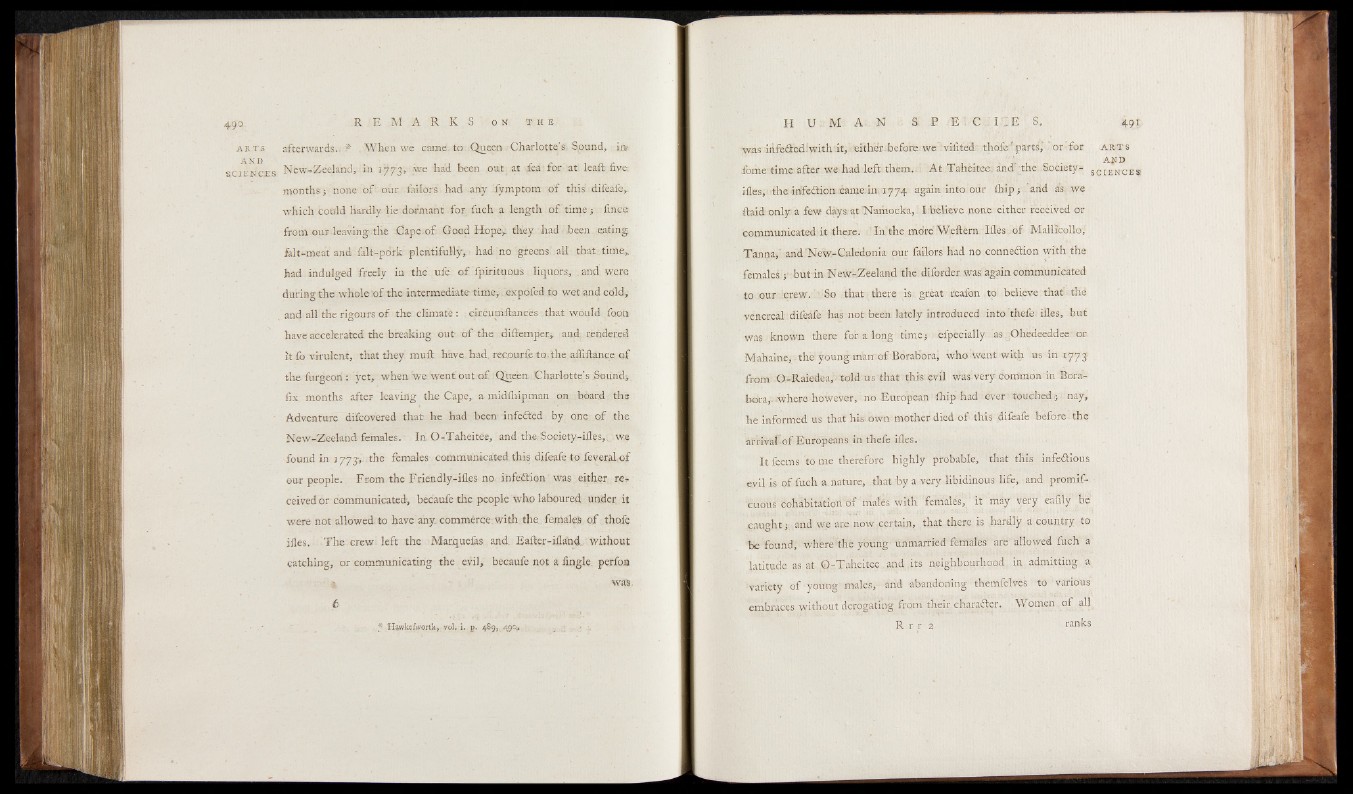
a r t s afterwards..-!* When we came, to Queen:Charlotte’s- S.ound, in
s c i e n c e s New-Zeeland, in 1773, we had been out; at fea for at leaft five
months; none of our tailors had .any iymptom o f this’ difeafe,
which could hardly lie.dormant for fuch a length o f time; fince
from our leav.ing.the Gape.of Good Hope,, they -had been eating
felt-meat and falt-pdrk’ plentifully, > had no greens! all that time,
had . indulged freely in the ufe of Tp'irituous liquors, . and were
during the whole;of the intermediate- time, ,‘expofed to wet and cold,
and all the rigours of the climate : c.ircumftances that would foon
have accelerated the breaking out- of the diflempet, and. rendered
It fo virulent, that they muft have had, rec.ourfeto.the afllftance. o f
the furgeon: yet, when we went out o f : Queen 'Charlotte’slSound;,
fix months after leaving the Cape, a midihipman on board the
Adventure di'feovered that he had been- infeCted. by one: of the.
New-Zeeland females. In O-.Taheitee, and the;Sop.iety-ifles,Ow®
found in 1773-,' the females communicated this difeafe. to feveral.of
our people. From the Friendly-ifl.es no infection' was either received
or communicated, becaufe the people who laboured under, it
were not allowed, to have any. commerce with the. femalefe of thofe
ifles. The crew left the Marquefas., and. Eafter-ifla’ntL without
catching, or communicating the evil, becaufe not a fingle. perfoa
a, was,
t>
• 5 H&wkefwortfo, vol; i. g. 489,^90». ■ y
was ihfedlediwith'it,' eithe'r, before wervifited thdfe:'p'arts,'.."or-for
fome time, after we had left them. A t Tahèiteesand'-the Society-
ifles,!th e infedtion came.in.i774 again into.our fhipj arid as we
ftaid only a few days at TSfamocka, I:helieve none either received or
communicated it there. In the more Weftern Ifléslóf Mallïcollo,
Tanna,' and’New.-Caledonia our failors had no connexion with the
females ;■ but in New-Zeeland the diforder was again communicated
to ourlerew. fS o that, there is,, great reafon to believe that; thé
venereal difeafe has not been lately introduced into thefe ifles, but
was known there for a long time; efpecially .as ,Ohedeeddee. or
Mahaine, .the' young man of Borah’ora, who went with us in 1773
from O-Raiedea, told nr, that this evil was very common in Bora-
Bora,. -where-however, no European'lliip had ever touched,; nay,
he informed us that his own ^mother- died o f this difeafe before the
arrival o f Europeans in thefe ifles.
ARTS
AJÜD
SCIENCES
It feems to me therefore highly probable, that this infectious
evil is of fuch a nature, that by a very libidinous life, and promif-
cuóus Cohabitation,of males with females, ' it may very eafily be
caught; and we are now certain, that there is hardly a country to
be found, wherefthe young unmarried females are allowed fuch a
latitude as at O-Taheitee and its neighbourhood in admitting a
variety of-young males, and abandoning themfelves to various
embraces without derogating from their character. Women of all
R r r 2 ranks